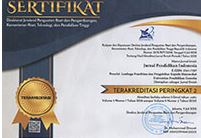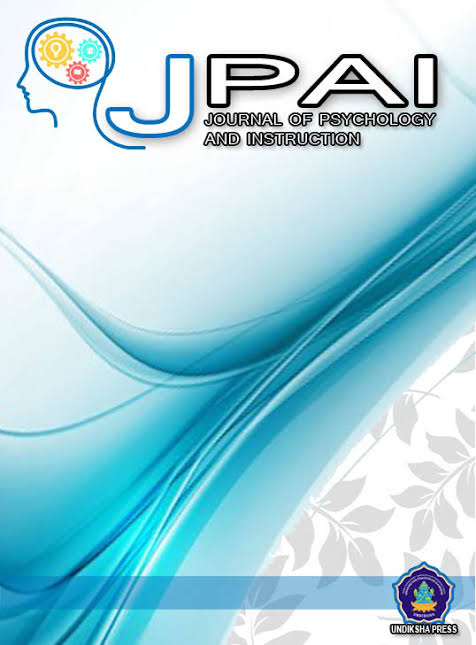Mentari's guide validation as a guidelines in teaching bath skills for tunagrahita children
DOI:
https://doi.org/10.23887/jpai.v4i3.33706Keywords:
intellectual disability, guide validation, self-help skill, bath skillsAbstract
Bathing skill was an important skill that should be possessed by intellectual disability children so that they become independent. The result of preliminary study indicates that mothers of the intellectual disability did not have knowledge and skills in teaching children’s bathing skill so they often help their children to take a bath. Based on the matter, it requires a guide to improve mothers’ knowledge and skill in teaching bath skill for intellectual disability children. This research is aimed to perform the validation of MENTARI guide through content validation with professional judgment and empirical validation which uses one-group pretest-posttest. Wilcoxon’s Signed Rank Test was utilized to test the score difference between knowledge and skill of teaching intellectual disability children to take a bath themselves. Nine mothers who have intellectual disability children become the participants. The research result indicates that MENTARI guide was contently and empirically valid. The guide has also satisfying content validity (Aiken’s V= 0,80-0.98). The data analysis which utilizes Wilcoxon’s Signed Rank Test indicates that there was an increase of score of bathing teaching knowledge and skill with Z =-2,670 and p<0.05 for knowledge score and Z value = 2,670 and p< 0.05 for bathing teaching skill score.
References
Agran, M., Sinclair, T., Alper, S., Cavin, M., Wehmeyer, M., & Hughes, C. (2005). Using self-monitoring to increase following-direction skills of students with moderate to severe disabilities in general education. Education and Training in Developmental Disabilities, 40(1), 3–13.
Ahluwalia, S. C., Gill, T. M., Baker, D. I., & Fried, T. R. (2010). Perspective of older persons on bathing and bathing disability: A qualitative study. Journal of Am Geriatr Soc, 58(3), 450-456. DOI: https://doi.org/10.1111/j.1532-5415.2010.02722.x
Ardic, A., & Cavkaytar, A. (2014). Effectiveness of the modified intensive toilet training method on teaching toilet skills to children with autism. Education and Training in Autism and Develompmental Disabilities, 49(2), 263-276.
Association, A. P. (2000). Diagnostic and Statistical Manual of Mental Disorders Fourth Edition Text Revision, DSM-IV-TR. American Psychiatric Publishing.
Azwar, S. (2016). Konstruksi tes kemampuan kognitif. Pustaka Pelajar.
Azwar, S. (2015). PENYUSUNAN SKALA PSIKOLOGI. Pustaka Pelajar.
Batu, S. (2008). Caregiver-delivered home-based instruction using simultaneous prompting for teaching home skills to individuals with developmental disabilities. Education and Training in Developmental Disabilities, 43(4), 541-555.
Caffarella, R. S. (2000). Goals of self-learning. In G. A. Straka (Ed.), Conceptions of self-directed learning: Theoretical and conceptual considerations (pp. 37-48). Waxmann.
Cavkaytar, A. (2007). Turkish parents as teachers: teaching parents how to teach self-care and domestic skills to their children with mental retardation. Education and Training in Developmental Disabilities, 42(1), 85–93.
Christensen, A., & Jacobson, N. S. (1994). Who (or What) Can Do Psychotherapy: The Status and Challenge of Nonprofessional Therapies. Psychological Science, 5(1), 8–14. https://doi.org/10.1111/j.1467-9280.1994.tb00606.x DOI: https://doi.org/10.1111/j.1467-9280.1994.tb00606.x
Durand, V, M., & Barlow, D. H. (2013). Essentials of abnormal psychology (6th ed). Nelson Education, Ltd.
Feldman, M. A. (1994). Parenting education for parents with intellectual disabilities: A review of outcome studies. Research in Developmental Disabilities, 15(4), 299–332. https://doi.org/10.1016/0891-4222(94)90009-4 DOI: https://doi.org/10.1016/0891-4222(94)90009-4
Field, A. (2013). Statistics using ibm spss statistics (4th ed). Sage Publications.
Hallahan, D. P., Kauffman, J. M., & Pullen, P. C. (2012). Exceptional learners: An introduction to special education (12th ed). Pearson Education, Inc.
Hardman, M. L., Drew, C. J., & Egan, M. W. (2002). Human exceptionality: Society, school and family. A Person Educaton Company.
Hiemstra, R. (1994). Self-Directed Learning. IACE Hall of Fame Repository. DOI: https://doi.org/10.1002/ace.36719946412
Hudson, A. M., Matthew, J. M., Gavidia-Payne, S. T., Cameron, C. A., Mildon, R. L., Radler, G. A., & Nankervis, K. L. (2003). Evaluation of an intervention system for parents of children with intellectual disability and challenging behaviour. Journal of Intellectual Disability Research, 47(4), 238–249. DOI: https://doi.org/10.1046/j.1365-2788.2003.00486.x
Idreez, S., & Faize, F. A. (2014). Improving adaptive skills in a child with mental retardation: A case study. International Journal of Academic Research, 6(3), 265–268. DOI: https://doi.org/10.7813/2075-4124.2014/6-3/B.39
Joseph, G., & Muthee, J. (2016). Role of parents in the education of mentally retarded learners in selected schools in madaraka zone, kiambu county, kenya. Journal of Education and Practice, 7(3), 19–24.
Kashima, K. J., Baker, B. L., & Landen, S. J. (1988). Media based versus professionally led training for parents of mentally retarded children. American Journal on Mental Retardation, 93, 209–217.
Katz, G., & Lazcano-Ponce, E. (2008). Intellectual disability: definition etiological factors, classification, diagnosis, treatment and prognosis. Salud Publica Mex, 50(2), 132–141. DOI: https://doi.org/10.1590/S0036-36342008000800005
Kaur, R. (2005). Special education: New tremds and innovations. Deep & Deep Publications PVT. LTD.
LaRue, R. H., Manente, C, J., Dashow, E., & Sloman, K. N. (2016). Functional skills. In: Singh, N. N. Handbook of evidence-based practices in intellectual and developmental disabilities. Springer International Publishing. DOI: https://doi.org/10.1007/978-3-319-26583-4_9
Mangunsong, F. (n.d.). Pendidikan anak berkebutuhan khusus. LPSP3 Fakultas Psikologi UI.
Martin, G., & Pear, J. (2003). Behaviour modification what it is and how to do it (7th ed). Pearson.
McMary, S., & Sarah, J. (2005). What successful teachers do in inclusive classroom: Research based teaching strategies that help special learners succeed. Corwin Press. DOI: https://doi.org/10.4135/9781483328928
Mohsin, M. N., Khan, T. M., Doger, A. H., & Awan, A. S. (2011). Role of parents in training of children with intellectual disability. International Journal of Humanities and Social Science, 1(9), 78–88.
Myers, A., & Hansen, C. H. (2012). Experimental Psychology (7th ed.). Wadsworth.
Naik, A. D., Concato, J., & Gill, T. M. (2004). Bathing disability in community-living older persons: common, consequential, and complex. Journal of Am Geriatr Soc, 52, 1805–1810. DOI: https://doi.org/10.1111/j.1532-5415.2004.52513.x
Narayan, J., & Kutty, A. (2001). Skill training in the mentally retarded persons: Bathing Package for Trainers. National Institute for the Mentally Handicapped.
Narayan, J. (2007). Intellectual disability: A manual for CBR Workers. Mental Health and Substance Abuse Departement of Noncommunicable and Mental Health.
Nevid, J. S., Rathus, S. A., & Greene, B. (2014). Abnormal psychology in a changing world (9th ed). Pearson Education, Inc
Peshawaria, R, & Venkatesan, S. (1992). Behavioral approach in teaching mentally retarded children: A manual for teacher. National Institute for the Mentally Handicapped.
Rowbotham, M., Carroll, A., Cuskelly, M. (2011). Mother’s and father’s roles in caring for an adult child with an intellectual disability. International Journal of Disability, Development and Education, 58(3), 223–240. DOI: https://doi.org/10.1080/1034912X.2011.598396
Russel, J. D., & Johanningsmeier, K. A. (1981). Improving competence through modular instruction. Kendall/Hunt Publishing Company.
Shenai, N. G., & Wadia, D. N. (2014). Development of a self care skills scale for children with developmental disorder: A pilot study. The Indian Journal of Occupational Therapy, 46(1), 16–21.
Udonwa, R. E., Iyam, M. A., Osuchukwu, N, C., Ofem, O, M. E., Etim, J. J., Ikong, M. A. (2015). Mentally retarded children and deficits in daily living skills: Case study of calabar municipality local government area, cross river state, nigeria. Journal of Research & Method in Education, 5(2), 21–26.
UNICEF. (2008). Monitoring Child Disability in Developing Countries : Results from the Multiple Indicator Cluster Surveys. In New York. https://www.unicef.org/spanish/protection/Monitoring_Child_Disability_in_Developing_Countries.pdf%0Ahttp://www.childinfo.org/files/Monitoring_Child_Disability_in_Developing_Countries.pdf
Wenar, C., & Kerig, P. (2006). Developmental psychopathology: from infancy through adolescence (5th ed). McGraw-Hill Companies, Inc.
Winarsih, S., Hendra, J., Idris, F. H., & Adnan, E. (2013). Panduan penanganan nak berkebutuhan khusus bagi pendamping (orang tua, keluarga, dan masyarakat). Kementerian Pemberdayaan Perempuan Dan Perlindungan Anak Republik Indonesia, 1–17. https://www.kemenpppa.go.id/lib/uploads/list/b3401-panduan-penanganan-abk-bagi-pendamping-_orang-tua-keluarga-dan-masyarakat.pdf










